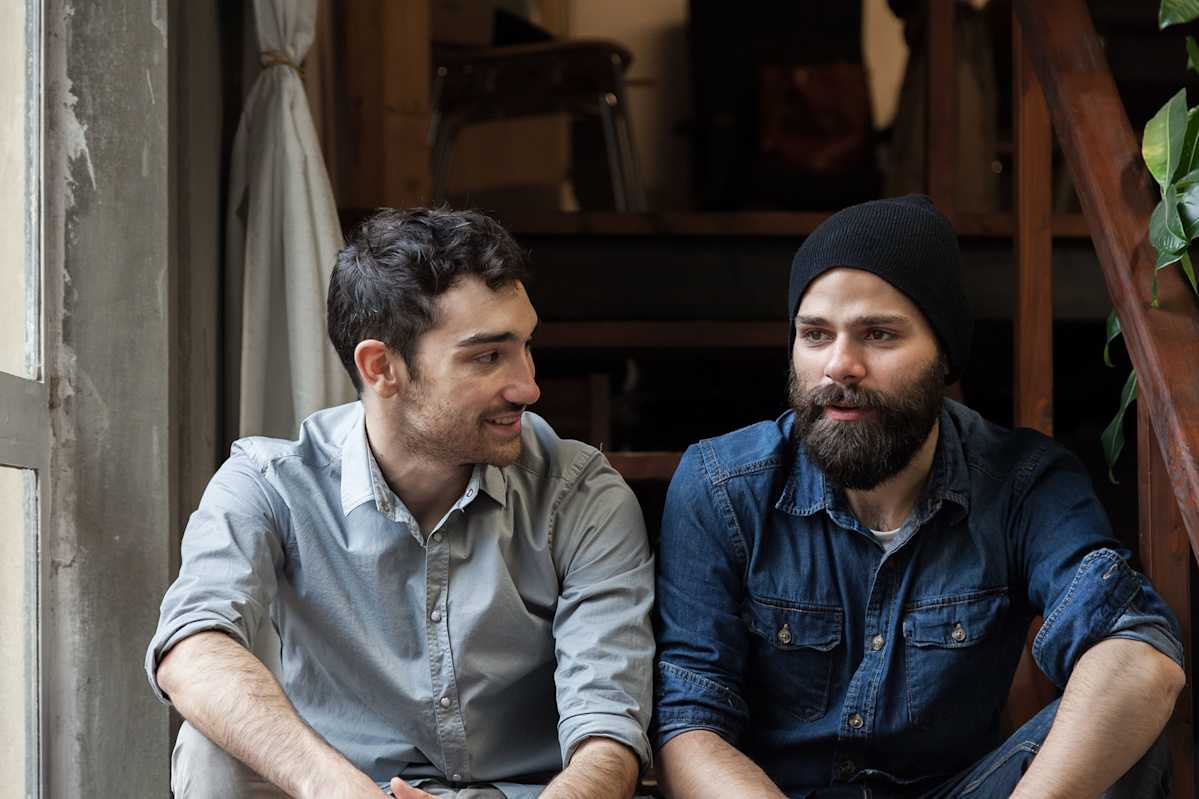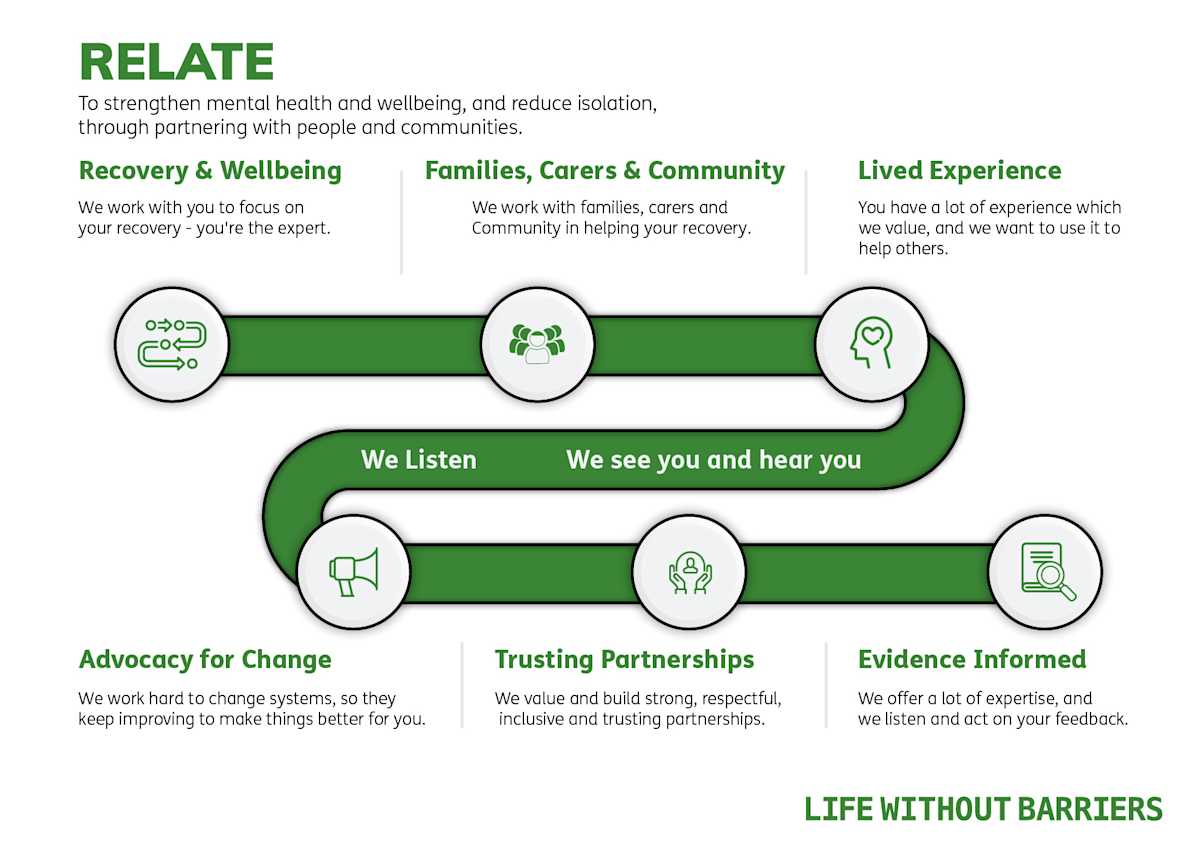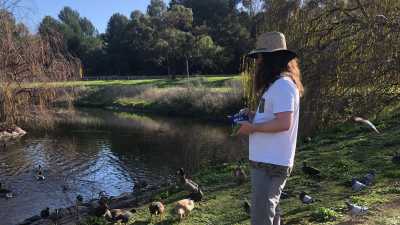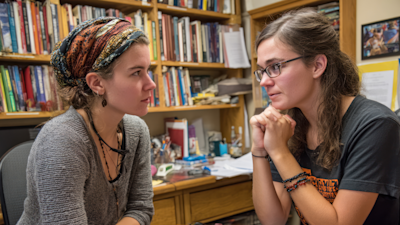
From crisis care to long-term psychosocial supports, Life Without Barriers partners with people and health services to strengthen recovery, independence and wellbeing.
Our impact
Our impact is seen in the outcomes that matter, people living well in their communities, families feeling supported, and health systems under less pressure.
People and families we support say our services make a real difference
94% of people are happy with their services
96% of people feel like they have a trusting relationship with their worker
91% of people say our services are helping them improve their lives
All figures are drawn from a 2025 survey of people supported by Life Without Barriers mental health services.
“I love that the program offers a flexible and refreshing approach, it’s not just about sitting in an office, which for me was the most intimidating part about seeing mental health care professionals. Being able to have sessions outdoors made me so much more comfortable."
For communities and health systems
Early intervention and hospital-to-home programs have reduced readmissions, built independence and strengthened community connections, easing pressure on clinical services.
Mental health services
Life Without Barriers provides a comprehensive suite of supports that respond to people’s needs at every stage of recovery. All our services are delivered with a focus on ensuring holistic wrap-around care.
Intensive crisis support: rapid, tailored care when people need it most, helping to resolve the crisis in a holistic person person-centred way.
Psychosocial support: delivered across residential, hospital and outreach settings, supporting people to set and meet their personal recovery goals, building skills, hope and independence.
Clinical and therapeutic support: helping people to navigate through an episode of mental ill health through evidence-based psychological services and assessments.
Hospital-to-Home transition: working alongside clinical teams to ensure safe and supported recovery back in the community.
Drug and alcohol support: including psychosocial integrated approaches to address co-occurring mental health and substance use challenges.
Group programs: peer-led and clinician-supported groups delivering psychoeducation and promoting skill development, social connection and confidence.
“It’s really good to have someone to talk to and get things off my chest.”
Our approach: the RELATE framework
RELATE is the Life Without Barriers' Mental Health Framework, it guides how we approach the planning and delivery of Mental Health services nationally. It was co-designed by Life Without Barriers along with consumers, families and carers. It ensures that all our services are recovery-focused, culturally safe, inclusive, and grounded in lived experience.
Embedding RELATE improves outcomes for individuals and reduces demand on acute health services, shortening hospital length of stay, reducing avoidable readmissions, and strengthening recovery in the community, thereby empowering people to recover in the environment that best suits them.

Image: The graphic image explains the Relate framework, with icons representing each element of the framework. The infographic within this image shows a pathway that links the icons, and there is text in the pathway that says ‘We Listen’ and ‘We see and hear you’.
What RELATE means in practice
Recovery and wellbeing: acknowledging that the people we support are the experts in their lives, we support people to set their own personal recovery goals and facilitate the connections and activities needed to achieve them.
Engaging families and community: we deliver family-inclusive practice, support individuals, carers and community to engage, connect and build networks of support.
Lived experience: recovery is shaped by those who have lived it. Peer workers and lived-experience leaders use their insight to keep services real, responsive and focused on what matters to people.
Advocacy for change: we push for system reform that reduces stigma and improves outcomes across communities.
Trusting partnerships: we work closely with local health providers, primary health networks, Aboriginal Community Controlled Health Organisations and housing providers to ensure smooth transitions between hospital and home.
Evidence-informed: guided by best practice, trauma-informed care, and continuous feedback and evaluation, including co-design, data, outcomes and feedback.
System benefits: We work collaboratively with our healthcare partners and stakeholders to enable people to stay in their homes and with community and loved ones while recovering from an episode of mental ill health or a crisis. This results in fewer readmissions, improved quality of life, and reductions in avoidable emergency department presentations, as well as stronger recovery outcomes for individuals and their families, and more sustainable mental health systems through community-based care.
Vision: To strengthen mental health and well-being, and reduce isolation, through partnering with people and communities.
Life Without Barriers’ will focus on your recovery and work with families, carers, and the community to support your recovery. We build strong, respectful, inclusive, and trusting partnerships.
Partnering with people to change lives for the better, we deliver safe services that encourage recovery and creativity, challenge stigma, and inspire hope.
Supports in action - stories of recovery
Recovery looks different for everyone. What doesn’t change is our commitment to walking alongside people as they define and achieve their own goals.
Why partner with us?
Inclusive by design
We are committed to providing culturally safe and inclusive services that reflect the diversity of the communities we serve.
Guided by our Elevate Reconciliation Action Plan, we partner with Aboriginal and Torres Strait Islander communities and Aboriginal Community Controlled Health Organisations (ACCHO) to co-design services that honour culture, kinship and identity. We tailor supports for people from migrant and refugee communities, create safe and welcoming spaces for LGBTQIA+ people, and invest in Aboriginal leadership across our workforce.
"I feel this is a space where I can express my feelings and emotions without judgement."
Powered by lived experience
The insights from lived experience are central to our approach. Our peer workforce brings empathy, credibility and hope, working alongside people through recovery.
Peer workers provide practical strategies and emotional support drawn from their own lived experience.
Lived-experience staff and leaders shape service design, evaluation and governance.
We create opportunities, through co-design and client voice feedback for people to share their stories in their own words, ensuring services remain authentic and responsive.
We create diverse opportunities for people to contribute to service design and delivery through stories, feedback and co-design.
"My team are understanding if they trigger an emotional response when discussing sensitive topics or seeking to address them. They ask my opinion and feedback as well."
Local solutions, national reach
Every community is different and so are the services we provide. We adapt supports in partnership with health services, housing providers and diverse community organisations. In regional areas, we work closely with local leaders to align with community priorities and build genuine relationships with local stakeholders and partners. In urban centres, our programs connect seamlessly with clinical and social services.
"They keep my identity private and show respect for my privacy on personal issues. They also speak my language."
Scale and capability
Life Without Barriers delivers mental health services through a large, multidisciplinary workforce. With over 100 skilled professionals nationwide, including a growing peer workforce, we bring both reach and depth.
Staff are trained in trauma-informed care, suicide prevention and culturally safe practice, supported by strong clinical and practice governance, as well as ongoing education and professional development opportunities, including reflective practice, skill development and access to current evidence. Our dedicated workforce pathways nurture and grow leadership across our services.
Strengthening recovery through innovation
We develop and test new models of mental health supports that improve recovery, expand access and deliver better outcomes for people and the health system.
Piloting new approaches: in Western Australia, the Swan View pilot explored new ways to help people move safely from hospital to home. The approach reduced readmissions and supported long-term recovery in the community.
Building evidence through research: with Monash University, we took part in the PULSAR Recovery Framework, one of Australia’s largest studies of recovery-oriented practice. The project gave valuable insights into how evidence-based approaches can be adapted and improved.
Expanding digital access: we are investing in digital supports to reach more people in rural and regional communities, improving access to care where it is needed most.
Integrated care: our mental health and alcohol and other drug services bring together skilled teams to provide holistic and coordinated support.
Shaping system reform: as a national provider with strong partnerships across government and community, we help shape policy and practice that lead to better outcomes in communities across Australia.
Reach out today
If you have any questions or would like to find out more about Life Without Barriers mental health services, complete the enquiry form, call, or email our team.
National service
My Pathway My future – a guide for individuals with psychosocial disability who require support with accessing and maintaining education, training and employment options.
Life Without Barriers is not a crisis service.
If you or anyone else is in danger, please call 000.
24/7 Crisis support services
If you or someone you know needs immediate help, you can contact the below free national crisis support services.
Lifeline 13 11 14 or Online Chat – Immediate crisis and suicide prevention support
Kids help line 1800 55 1800 or Online Chat – Phone and online counselling for young people aged 5 to 25
13YARN 13 92 76 – First national support line for Aboriginal & Torres Strait Islander people in crisis. By and for mob.
BeyondBlue 1300 22 4636 or Online Chat - Mental health support for people who are concerned about anxiety, depression or suicide.
Suicide Call Back Service 1300 659 467 or Online Chat - Phone and online counselling for people at risk of suicide, concerned about someone at risk, and bereaved by suicide.
1800 RESPECT 1800 737 732 or Online Chat – Support for people affected by domestic, family and sexual violence.


